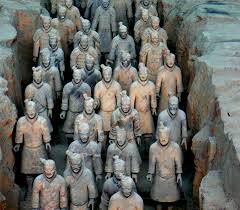01.16.14A Vast Army of Terracotta Warriors: Just How DO We Teach History?
 Lisa Hansel’s outstanding blog post on the decline in time spent on History in American schools made reference to a blog post over at EdWeek called “We’re Teaching History Wrong.” It decried our methods of teaching history. This quotation caught my eye:
Lisa Hansel’s outstanding blog post on the decline in time spent on History in American schools made reference to a blog post over at EdWeek called “We’re Teaching History Wrong.” It decried our methods of teaching history. This quotation caught my eye:
“To the vast majority of students, history is presented as a litany of disconnected names, dates, and events to be memorized before an exam.”
It seems like pretty often I read a piece calling out those acolytes of memorization, who stand at the front of our History classrooms wordlessly demanding the rote memorization and recall of facts, the more disconnected the better. I imagine them like Emperor Qin’s Terracotta Army all lined up in their out-of-fashion uniforms, only moving to hand out those exams that exclusively value ‘regurgitation.’ Damn those cursed History teachers!
(As an aside, I was never really clear on how they went about ensuring that that facts remained disconnected, since as the novelist Walker Percy puts it, “Small disconnected facts, if you take note of them, have a way of becoming connected,” but, I thought, maybe this would be the article where their methods would be exposed.)
But, alas, it turned out that the author wasn’t actually a teacher. She was a ‘volunteer tutor,’ a fact I mention because it made me start to wonder: Actually, how does she know what most History teachers do?
In fact, how does she, or anybody who tells us what “most people do” know these things? I mean it seems like as lot of people accept this as an article of faith: memorization is the primary tool of History teachers. But on what grounds do they say that?
Since I don’t know for sure either, I’d like to ask: Can anyone out there provide some data—quantitative, anecdotal, anything—that suggests that most History teachers do in fact favor memorization as their primary tool? In all seriousness, is there a single History teacher to whom someone can point me who can be shown, under amnesty, to teach History this way?
In fact I’ll make my challenge easier; I’ll give you a pass on the author’s assumption that the teacher’s facts need to be “disconnected.” If you know (or ARE!) a History teacher who insists on presenting only a litany of connected names, dates, and events to be memorized before an exam, please contact me.
 I ask because the great majority of the History teachers I know–not a valid data set surely, but the only data i have–are not only pretty good at their jobs, but also committed to teaching history as a narrative of events and lives which we interpret with subjectivity. They try to balance the need for factual knowledge with the desire to make it engaging and relevant but they know the two can’t be separated. This is why historians, people who spend their lives acquiring knowledge about the past, tend to have such powerful insights about it–and the present. Knowledge—including knowledge of facts—is a necessary condition to thinking and insight, not their opposite. History, after all, doesn’t seem relevant to you if you don’t know much about it. Faulkner sagely observed that the past is not a “was” but an “is,” but of course if all those echoes of and allusions to the past go right by you, you don’t really see why you’d care about it any way.
I ask because the great majority of the History teachers I know–not a valid data set surely, but the only data i have–are not only pretty good at their jobs, but also committed to teaching history as a narrative of events and lives which we interpret with subjectivity. They try to balance the need for factual knowledge with the desire to make it engaging and relevant but they know the two can’t be separated. This is why historians, people who spend their lives acquiring knowledge about the past, tend to have such powerful insights about it–and the present. Knowledge—including knowledge of facts—is a necessary condition to thinking and insight, not their opposite. History, after all, doesn’t seem relevant to you if you don’t know much about it. Faulkner sagely observed that the past is not a “was” but an “is,” but of course if all those echoes of and allusions to the past go right by you, you don’t really see why you’d care about it any way.
Here’s my colleague Robert Pondiscio, writing about President Obama’s inaugural address:
[It] placed us — all of us — in the flow of history. With its references to the “rights of man,” our “common defense,” ideals that “light the world,” and a generation that “faced down communism and fascism,” the address was surely met with either nods or blank stares. If our children do not know the events and phrases to which Obama referred, they cannot fully appreciate the significance of this moment or even what this President is asking of them. How is it possible for them to be “the keepers of this legacy” — why should they value it and seek to keep it at all? — unless they understand the thing they are being asked to keep?
Ironically, my sense is that—this is an educated guess but it comes from the time I’ve spent observing History teachers—if anything many History teachers start by going more heavily for the engaging story, the dramatic application, the experiential learning at the expense of facts, especially when they are just starting out. Over time, they start to realize: ‘Hey, my kids need more context here; I’m going to strike a balance slightly more towards the names and dates.’ Their engaging dramatic experiential stuff works a lot better when it’s the capstone to a deep and factual study, not a daily substitute for it. Perhaps they have to make this correction because they start out listening to red herrings like, “to the vast majority of students, history is presented as a litany of disconnected names, dates,” and so they think they need to compensate for a world in which all the other History teachers out there are forcing students to memorize atomized facts in anticipation of exam after exam, which of course isn’t true.
I don’t have much data beyond my own observations of teachers, of course, and my observations tend to be skewed towards watching really good teachers (Thank you, by the way, each and every one of you!!) so maybe that’s why I see it differently, but regardless, I smell a rat on the assumption that most-history-teachers-think-they-should-memorize–disconnected-facts.
 A teacher friend in a large city school district once went to a PD called “No More Trivial Pursuit!” The facilitator demanded “It’s not important to know the War of 1812” (“Like we ever taught it,” my friend adds here). “It’s more important for students to grapple with ‘essential questions’ like ‘Is war ever justified.’”
A teacher friend in a large city school district once went to a PD called “No More Trivial Pursuit!” The facilitator demanded “It’s not important to know the War of 1812” (“Like we ever taught it,” my friend adds here). “It’s more important for students to grapple with ‘essential questions’ like ‘Is war ever justified.’”
“How the hell you can have an opinion worth having without knowledge to draw upon was not discussed?” my friend asked. I’m making a list here of the wars I’d want to consider and know something about before I decided on the small question of its justification. Does anyone else fear the hubris we’re building in kids by telling them they should have strong opinions about things they’ve spent a day or two studying?
Note to History teachers: I have three kids, and if you ever get one of mine, I’m good with your opting for the War of 1812, ok? The good news is that you usually don’t have to make that case to the History teachers themselves. Most of them, I am really happy to say, know the difference between history and historically-set-imaginative-play, which is different, and characterized by the irrelevance of facts. (See further: Donald Trump)
Anyway, it struck me that if I un-loaded the (very loaded) language in the cliché the author of “We’re Teaching History Wrong” offered to describe the problems with teaching of History, I could help her revise her statement to describe what the solution might look like. Consider a change from this:
Historical teaching is “a litany of disconnected names, dates, and events to be memorized before an exam.”
To this:
Historical teaching is “a series of connected events (including names and often even dates) to be learned, reflected on, understood within a larger timeline of history and sometimes even committed to long term memory*.”
*Committing key ideas and events to long-term memory is important because it allows you to access them without using up active processing capacity, the kind you use to think, “Hmmm, is that right?” or “Hmmm, I think I’ve read something like that before.” Having information in long-term memory allows students to think, “Hey wait a minute, that sounds a lot like what Napoleon said at Waterloo and Waterloo didn’t go so well for Napoleon.” Daisy Christodoulou’s amazing book, Seven Myths About Education has a great discussion on this point.

Well said. I was extremely please to see you writing on the importance of history, as well as address those who criticize the memorization of certain critical events in history. I believe that only with a solid grounding in historical events and contexts is deep comprehension possible. Keep up the hard work Doug, I can’t wait for TLAC 2.0.
Thanks, Keith! “Only with a solid grounding in historical events and contexts is deep comprehension possible”–perfectly said.
All great points & I was one of those history teachers in their first few years who made that transition to more context/facts.This summer I did an Independent Study
on critical thinking which confirmed what had been dawning on me as a 5th
year middle school SS teacher – you can’t expect kids to think critically/participate
in experiential projects unless they have a strong foundation of knowledge/facts
in that domain. As a soccer coach I’ve come to a similar conclusion – we can’t expect kids to be creative on the ball if they don’t have the foundational skill set to receive the ball reliably. The beautiful struggle is to find that balance in allocating class time to the acquisition/retention of knowledge/facts (which are essential for deeper meaning) so you can build up to the experiential projects and critical thinking.
Thanks, Josh. Interesting connection. Soccer: yeah, how often do we say we want kids to be creative and then, when we see what they do–you did a Cruyff Turn WHERE??–we realize that creativity needs some knowledge to be productive. What’s most valuable is inserting a creative insight into a moment in a way that shows your understanding of what that moment means. To say “everyone expected the thru ball there so it was brilliant to cut it back across the grain ” is to say “you understood the traditional expectation of through ball in situations like that.” that is: you understood the historical context. “Grant should have just sent a tank division into Vicksburg” is creative. it’s just historically ignorant…
A friend recently told me that his seven year old child had memorized a song that laid out major nations and important figures from history in a chronological order. Instead of *gasping* at such memorization, I applauded such an effort due to the benefit such knowledge will have. After all, if one doesn’t have a historical framework, where will one place all other knowledge? On a blank canvas that will create disorganized thinking, that’s where.
Doug’s point about “facts first, opinions second” was a great one. Such facts are the foundation, carefully laid, that the frame of critical thinking will later stand upon (I’m agreeing with @disqus_bt6piWEvMI:disqus, here). Consider the alternative: what else can serve as the basis of analysis, interpretation, and opinion?– Feelings? Biases? Unfortunately, that’s all that is left to guide a mind not filled with such knowledge. Regrettably, I see this type of analysis too often– not only by students, but adults in the public square, i.e., politicians, news anchors.
Thank you! “We have to teach more than facts & dates…” is a tiresome, straw-man argument indeed. Sadly though, we’d probably be better off with that problem, than our current problem: the empty-calorie fun of constructivist learning.